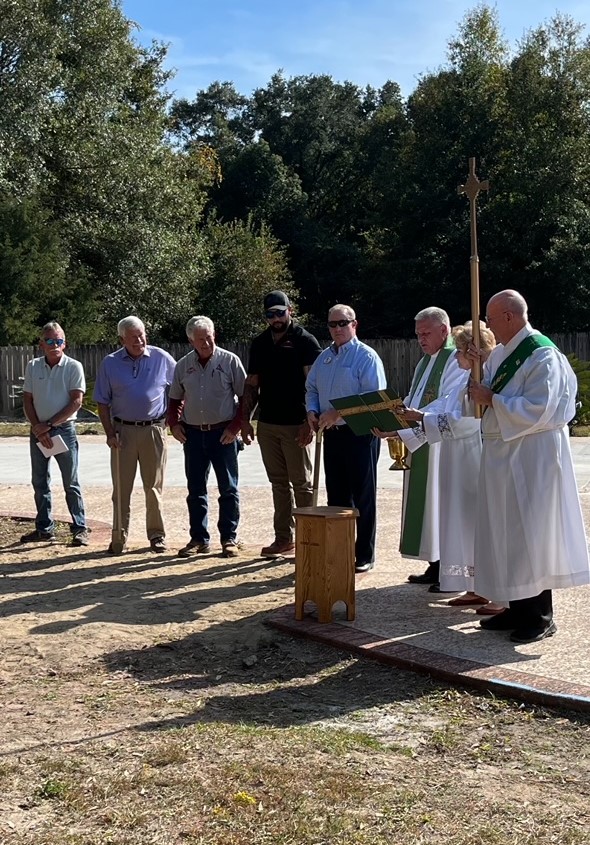In Faith

“We must always give thanks to God for you, brothers and sisters, and rightly so, because your faith is growing more and more, and the love all of you have for one another is increasing.” 2 Thessalonians 1:3

The congregation of St. Paul located in Pensacola, Florida began the discernment process of leaving the ELCA in 2018. We had the 2nd vote to leave the Florida-Bahamas (FB) Synod of the ELCA in 2019. We expected some challenges in leaving because of the small group of members who wanted to remain in the ELCA. The congregation voted with a super-majority to leave the FB Synod. St. Paul applied to and joined the North American Lutheran Church (NALC) in 2020. Shortly after being received into the NALC, the congregation council received a letter from the FB Synod informing us that we could not leave.
The congregation council of that period were faithful in their commitment to Christ. They had a strength in faith that was unwavering. It proved to be a blessing for us as the FB Synod attempted to stop the people of God from leaving. To resolve the issue of St. Paul leaving the ELCA, the congregation council filed a motion in court. This was to maintain our rights to the building and the financials of St. Paul. During the legal process, letters with false statements were sent to the church members of St. Paul (NALC). Slanderous statements were made against the council and me. The ugliness of letters from the FB Synod showed a lack of Christian love for others and did not speak the truth of the intentions within the ELCA. The object of the ELCA was and I believe still is to “suppress the truth” of what they are doing or what they have done. We had suggested that the majority (us) and the minority (them) could share the building. But that was met with another ugly response. The Bishop of the FB Synod stated in words like these: Any other denomination but the NALC would have been okay. But not the NALC.
Eventually after many legal disputes the FB Synod Bishop filed a summary of judgment with the claim of ecclesiastical hierarchy. Taking the matter away from the civil court and giving it back to the FB Synod to make the final determination. The ruling gave our building, bank accounts, and endowment funds to the FB Synod and the small group of people who wanted to stay in the ELCA.
This could have been crushing for us if it were not for “faith.” Instead, the ruling of the judge based on the ecclesiastical hierarchy was freeing! Shortly after we lost everything to the ruling, God founded a new name for us. Led by the Spirit, Epiphany Lutheran Church became our new name. In 2021 we sought and found a new location for worship. I was introduced to Rabbi Tokajer in September, and we began worshipping at the Synagogue on Nov. 7, 2021.
In faith we left the building in Pensacola for a new beginning. With our vision clear and our faith steadfast in Christ, we began rebuilding and evangelizing for God’s church in the new location. With little financial stability we stepped out. In our faith journey, we didn’t think about what was lost. Instead, we recognized how much God was providing.
I encourage pastors discerning their call to contact the General Secretary of the NALC. The threats from the ELCA that place fear into individual pastors is nothing more than evil. If you want to remain faithful to the Word of God, I encourage you to place your assurance in Christ not the ELCA. The letters I received informed me that I was nothing without their endorsement. The ELCA didn’t call me into ministry. God called me into the ministry of Word and Sacrament. What about my pension and medical benefits? Have faith! As God is my witness, this question came to my mind too. It was a fleeting thought as I discerned the call to serve in faithfulness.
In March of 2023, I spoke to the congregation about our faith walk. I referred to the summary of judgment and the loss of our assets and property. In the message of faith I said, “We lost everything for the sake of Christ.” It is in this loss that we found out just how strong and faith filled we were. As I’ve said many times, “It’s easy to have faith when everything is going well in your life.” With the help of God, we’ve grown in number, in spirit, and in faithfulness. Like the letter of Paul to the Thessalonians, we lift up the church and all those who continue their journey in “faith.” We share the love of Christ with new believers and all visitors at Epiphany Pensacola. All are welcome to experience the love and joy of Christ in worship.

As I am writing this article it just dawned on me that on Nov. 7, 2023, when we break ground on a new church building it will be our 2nd anniversary of this new start congregation in Pensacola, Florida. God has blessed us with generous financial support for the church property. The mission and ministry have been financially supported by several NALC churches. We’ve received domestic mission partnerships from other NALC churches. The congregation has grown, and the people of God have been generous in supporting the mission and ministry of Christ. Losing everything for the sake of the Gospel has been transformational to the members of Epiphany Pensacola.
Faithfully Serving,
The Rev. Dr. Franklin J. Gore
Epiphany Lutheran Church
850-287-5667
“For it is by grace you have been saved, through faith – and this not from yourselves, it is the gift of God – not by works, so that no one can boast.” (Eph. 2:8-9)
Photos courtesy of Brenda Ekstrom and Donna Busarow.

